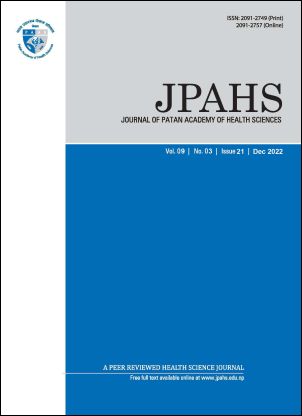Antenatal visits and obstetric outcomes during nationwide COVID-19 lock down period in a tertiary hospital of Nepal
DOI:
https://doi.org/10.3126/jpahs.v9i3.52266Keywords:
COVID-19, Lockdown, Preterm BirthsAbstract
Introduction: Maternity services were disrupted during nationwide COVID-19 lock down period. This study aimed to evaluate the impact of nationwide COVID-19 lock down on antenatal visits and obstetric outcomes in a tertiary hospital of Nepal.
Method: A study was conducted at Patan hospital, Nepal with regard to antenatal visits and obstetric outcomes during COVID-19 lockdown period (24th March to 14th June 2020) and was compared to non COVID-19 period (24th March to 14th June 2019). A Chi-square test was used to determine the association between the outcome variables. The data was taken as statistically significant when the p-value was <0.05.
Result: A total of 4,157pregnant women visited antenatal clinic (ANC) during nationwide COVID-19 lock down period while 7,029 patients visited during same period a y back (non COVID-19 period) which is a 40.86 percentage decline. There was significant reduction in deliveries during COVID-19 lock down period (1604 during non COVID-19 and 1140 deliveries during COVID-19 lockdown period respectively) but mode of delivery was similar. Maternal complications like postpartum hemorrhage (PPH), intensive care stay (ICU), sepsis and cesarean hysterectomy were similar during both the period.
There was a significant reduction in preterm deliveries during COVID-19 lock down period (13 during non COVID-19and 8.7 percentage during COVID-19 period respectively). However, early neonatal sepsis (EONS) was significantly higher during COVID-19 lock down period.
Conclusion: While, there was a significant reduction in preterm births and increase in early neonatal sepsis during COVID-19 lockdown period, there was no difference in maternal outcome.
Downloads
Downloads
Published
How to Cite
Issue
Section
License
© Journal of Patan Academy of Health Sciences
Submission of the manuscript means that the authors agree to assign exclusive copyright to JPAHS. All authors must sign a Copyright Transfer and Author Agreement form upon submission of the manuscript to the Journal. The work shall not be published elsewhere in any language without the written consent of JPAHS. The articles published in this journal are protected by copyright which covers translation rights and the exclusive rights to reproduce and distribute all of the articles printed in the journal.




